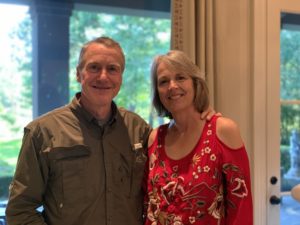February Advocate Spotlight: Jim and Jane Funke
 This month, we invite you to meet CASA Advocates, Jim and Jane Funke. The couple’s CASA Case Supervisor, Kristy O’Neal, nominated them for the Advocate Spotlight.
This month, we invite you to meet CASA Advocates, Jim and Jane Funke. The couple’s CASA Case Supervisor, Kristy O’Neal, nominated them for the Advocate Spotlight.
“Both Jane and Jim take advantage of CASA’s training opportunities throughout the year. They communicate with me on a regular basis, and they meet all minimum expectations without any prompting,” Kristy said. “Jane has been assigned to twenty-four cases. She excels in Collaborative Family Engagement. She regularly facilitates family group meetings when possible. She also has worked hard to line up opportunities for a young adult aging out care in her case—looking for high school/GED options, college possibilities, PALS paperwork, etc.”
We asked Jane and Jim to share about their experiences as Advocates.
What kind of problems do Advocates help solve?
Jim: Advocates provide support for kids in foster care and ensure their voices are heard in court. In a system that is overworked and short-staffed, CASA is a consistent presence for the child.
Jane: The CASA is the squeaky wheel, keeping the child in the minds of those who surround them while in care. I have the privilege of being a constant connection in their life for at least a year, often longer. Caseworkers, attorneys, foster parents, and therapists may come and go, but we follow them throughout their time in the child welfare system.
How did you first hear about CASA?
Jane: Our friends Dan and Laurie Rhude invited us to the Gala, and we attended with them for several years.
What attracted you to this cause?
Jane: One year at the Gala, after watching the video of a child and family positively impacted by the actions of their Advocate, I realized that was what I wanted to do.
Jim: Giving back to our community and knowing that we could make a difference. We were first involved as donors. I then joined the board for six years before I became an Advocate.
Did you have any reservations about becoming an Advocate?
Jane: It seemed a little scary. By nature, I am a nonconfrontational person, so I was worried that I might not be strong enough to do what was required. However, the training was great, and I had a wonderful supervisor to guide me. Once I met the child, I was hooked and never looked back. I’ve found it is quite easy to speak up for what they need and speak the truth in court.
Jim: None. I live with an amazing, seasoned mentor and one of the best Advocates we have.
Describe how you felt when you first started as an advocate.
Jim: I quickly realized there is a lot to learn. Jane and I worked together on a case with four kids. That would have been tough to do on my own.
Jane: At first, I only wanted to work with young children or babies. Teenagers seemed too hard, and we’d just gotten our two teens off to college. Well, I was right—they are hard! But I’ve worked with quite a few teens, and I’ve found it to be enlightening and rewarding. Teens who are removed from their families often have already had a very traumatic childhood. Their wounds are deep and raw. They are wily and street-smart, and they don’t trust anyone. But give them some one-on-one time and ask them what happened to them. Being heard by someone opens some doors to healing for them. I’m amazed at their resilience and courage.
With so many great organizations, why should one choose CASA?
Jim: Advocates make a meaningful difference in the lives of children in foster care. When donors support CASA of Montgomery County, their contribution has a direct impact on our community.
Jane: Anyone can become an Advocate, but it’s not for everyone. There are highs and lows in the work, but there’s no doubt that we change the lives of the children we serve. We see it in their smiles when we visit, the tears when they are having a rough time, the “till I see you next time” hug at the end of the visit. Recently, I saw the difference in a seventeen-year-old who opened up to me about his fears for the first time. Half of the kiddos in foster care are male, so it’s always good to have more men volunteer. There are many other ways to become involved with CASA, and we couldn’t do our advocacy work without the generous support of so many individuals, businesses, and service organizations.
What have you learned about children in foster care?
Jane: The importance and value of connecting with the families of the children we serve. When I first started, I rarely met or spoke with the parents after the initial hearing. Now much of my time is working with the parents and other family members to try to find a way for the children to either be reunified with their mom or dad or be cared for by relatives so that we can preserve the family connection. Also, understanding how trauma impacts every child and family we work with has been eye-opening and transformational.
Jim: If children are not reunited with their parents or family, there is a hole in their young lives that takes time to fill. Trauma is real, and it takes a village and time to help heal. We help nearly all of them, some in small ways and others in big ways.
What is most surprising to you about your role as an Advocate?
Jim: CASA is well respected and appreciated by everyone we work with, especially when we have respect for everyone involved, communicate effectively, and show compassion.
Jane: After all these years, I’m still surprised at the tremendous impact we can have on the lives of the children we work with. I’m not an expert in social work or child welfare, yet people listen to what I have to say because sometimes CASA is the common sense in the room. We can call it like it is. We’re extremely lucky to have a judge who values and appreciates our opinions. I admire and respect the dedication of the professionals—foster parents, caseworkers, attorneys and therapists—who do this work day in, day out.
Is there a particular moment or memory that stands out for you?
Jim: At the second visit to the boys in my first case, one of them rode his bike to the end of the street to meet me and give me a hug.
Jane: Several years ago, I was advocating for a five-year-old boy. His foster parent dropped him off at a mental hospital on a Friday night with no plan to return for him, ever. I didn’t find out until Monday. When I got to the pediatric unit that day, his face lit up. He ran over and said, “How did you find me?” That was a profound moment, and it has impacted everything I do for every child since. They all deserve to be found and heard.
EVERY CHILD DESERVES A CHANCE … IT’S YOU!
Learn more about becoming a CASA volunteer: VOLUNTEER or give online: DONATE.
